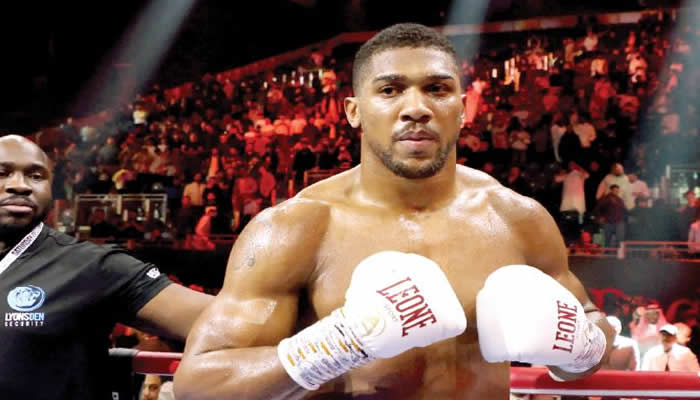Anthony Joshua, the former heavyweight boxing champion, recently embarked on a jog through the vibrant streets of Lagos, Nigeria, his ancestral homeland. The impromptu run quickly transformed into an impromptu meet-and-greet as throngs of excited fans recognized the global boxing icon. Joshua, clearly energized by the warm reception, documented the experience in a video shared on social media. The footage captures the jubilant atmosphere as fans cheer, offer fist bumps, and express their admiration for the boxer. This spontaneous connection with his Nigerian fanbase sparked a moment of reflection for Joshua, prompting him to contemplate his career, legacy, and the enduring nature of fan support.
Joshua’s social media post accompanying the video reveals his internal dialogue regarding these themes. He expresses a deep passion for his sport, comparing himself to basketball legends like Larry Bird, Magic Johnson, LeBron James, Michael Jordan, and Kobe Bryant. He uses the phrase “I love the hustle,” suggesting a strong identification with the dedication and hard work required to reach the pinnacle of athletic achievement. However, amidst this affirmation of his love for boxing, a question lingers: “You know I got dough, I could leave the game… But if I leave… Are the fans still gonna love me, man?” This reveals a vulnerability, a concern that his adulation is tied to his in-ring performance and success. The statement, “I get love out here in the streets, man,” underscores the significance of the connection he felt with the people of Lagos, seemingly validating his sense of worth beyond his boxing accomplishments.
The responses to Joshua’s post provide further insight into the complex relationship between athletes and their fans. One commenter, Balogun Ridwan, affirms Joshua’s “street cred,” suggesting that his connection with the community transcends his sporting achievements. Another, Michael Niiboi, acknowledges Joshua’s struggles and triumphs, emphasizing his role as a representative of Africa. This comment highlights the weight of expectation and the sense of collective pride associated with Joshua’s success. It also suggests that the fans’ love and respect are, at least in part, rooted in his resilience and representation of their shared heritage.
Another commenter, Steve Alton, offers a different perspective, suggesting that Joshua has already achieved enough in the sport and should focus on sharing his knowledge and helping others achieve their dreams. This perspective shifts the focus from personal accolades to a broader impact on the community. It suggests that true legacy lies not only in winning titles but also in empowering others. Similarly, another commenter, simplysnipes, encourages Joshua to leave a lasting legacy by investing in his people and his country. This perspective emphasizes the importance of using his platform and resources to contribute to the development of Nigeria, suggesting that true greatness extends beyond individual achievements to encompass a commitment to societal betterment.
The diverse range of responses to Joshua’s post underscores the multifaceted nature of fan support and the various expectations placed upon high-profile athletes. Some fans value the thrill of victory and the pride associated with their hero’s accomplishments, while others prioritize lasting impact and community contribution. Joshua’s public pondering of these issues reflects a growing awareness among athletes of the broader societal role they play and the potential to leverage their influence for positive change. The incident in Lagos highlights the power of personal connection and the enduring impact of face-to-face interactions between athletes and their fans. The spontaneous outpouring of affection Joshua received on the streets of Lagos seems to have touched him deeply, prompting him to reflect on the meaning of his career and the nature of his relationship with his fanbase.
The video and subsequent social media interaction offer a glimpse into the inner world of a celebrated athlete grappling with questions of legacy, purpose, and the enduring nature of fame. Joshua’s vulnerability in expressing these doubts resonates with a wider audience, as many can relate to the search for meaning and purpose beyond professional achievements. The incident also serves as a testament to the power of sport to connect people, transcending cultural and socioeconomic barriers. The genuine warmth and enthusiasm displayed by the fans in Lagos demonstrate the deep emotional connection that can exist between athletes and their supporters, and the profound impact these connections can have on both parties. The experience seems to have reaffirmed Joshua’s connection to his Nigerian roots and sparked a deeper contemplation of his future path, both inside and outside the boxing ring.














